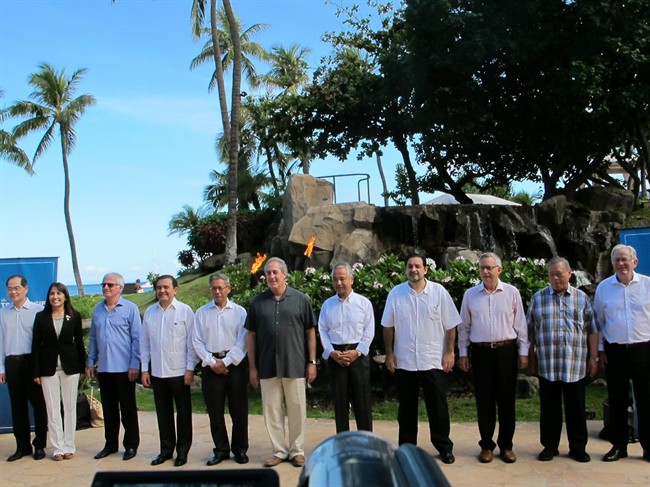OTTAWA – Other parties around the bargaining table are growing exasperated with Canada for stonewalling their demands to pry open its dairy market as part of a major global free-trade deal.

But cracks in the Canadian government’s position have begun to show as an agreement on the Trans-Pacific Partnership appears within reach, says a trade envoy for the New Zealand government at the talks in Hawaii.
READ MORE: Harper government hopes TPP deal is signed before election campaign kickoff
Even so, protectionist stances by Canada and Japan on dairy-market access remain rigid and could even prevent the pact from being signed this week, Mike Petersen told The Canadian Press in an interview Thursday.
“It is so small that it’s hard to take it seriously at this point,” Petersen said of an offer by Canada to unlock the door to its dairy market.
“Frankly, the discussion’s at such a level that it’s become incredibly frustrating if we really want to get a decent deal out of here.”
The 12-country negotiations for the Trans-Pacific Partnership, which includes Canada, the U.S., and Japan, are aimed at creating nothing less than the largest global trade deal in history.
Supporters of the agreement say it would give Canada access to enticing markets in Asia and, in particular, Japan — the planet’s third-largest economy. They argue many sectors would stand to benefit, including the services industry as well as beef and pork producers.
But as with any trade deal, Canada would have give something up to collect the bounty.
One of the main concessions targeted by other countries at the table: reducing Canada’s protectionism on dairy imports.
Domestically, a government decision to loosen supply management of the dairy sector would be politically delicate, particularly ahead of the October election. The prospect of opening up access to the market has been met by strong opposition from dairy farmers and has even stirred protests.
READ MORE: Canada, Japan at odds over B.C. timber in TPP trade talks: documents
The governing Conservatives, however, are hoping to complete the agreement before an election campaign that’s widely expected to start Sunday. A signed deal could serve as proof of the party’s economic credentials.
Prime Minister Stephen Harper insisted in a Bloomberg interview this week that his government will defend the interests of every Canadian industry “as best we can.”
On Thursday, a spokesman for International Trade Minister Ed Fast said the countries still have to negotiate a number of very serious issues, and denied that any one particular sticking point is preventing a deal.
“I view this type of pressure tactic as just more negotiating through the media, and we’ve been consistent in not engaging in that, preferring instead to sit down at the table in a more constructive manner,” Rick Roth wrote in an email.
- Some fixed mortgage rates are up despite hints of Bank of Canada cuts. Why?
- Lynx Air says passenger refunds will hurt investors because of defiant contractor
- Budget 2024 sets up a ‘hard year’ for the Liberals. Here’s what to expect
- As Tim Hortons tests plastic-free lids, how eco-friendly are alternatives?
“At the end of the day, our goal is to secure the best deal for Canadians, something which we can sell to the Canadian people.”
While the Harper government has been reluctant to discuss the status of negotiations in public, Petersen said it’s an open secret at the Hawaii meetings that the Canadians want to wrap things up by the end of the week.
READ MORE: Mulcair urges Harper to defend supply management during TPP negotiations
“They’re quite convinced that ministers will leave this place on Saturday with a deal to take back to their respective countries,” said Petersen, who works closely with New Zealand’s trade minister and its negotiating team, but is not at the actual table.
He said the fact Canadian negotiators are actually discussing dairy-market access at these meetings is significant, because they have refused to talk about it in the past.
Petersen declined to go into details about the cards Canada has put on the table, but he said it will have to offer more concessions on dairy access at the ongoing talks than it gave up while negotiating its free-trade deal with the European Union.
Supply management has been openly criticized in the past by Canada’s partners, including last winter when influential U.S. lawmaker Paul Ryan mused about booting his northern neighbour out of the Trans-Pacific talks if it refused to undo the system.
Last fall, Gary Doer, Ottawa’s ambassador to Washington responded to American frustration on the issue by saying: “Good. I’m sorry. I’m sorry. I consider that a compliment.
“We’re not going to be in a situation where you negotiate an agreement and everyone on (Capitol) Hill can amend it.”
The federal government says the countries involved in the negotiations represent some 800 million people with a combined gross domestic product of roughly 40 per cent of the global economy.



Comments